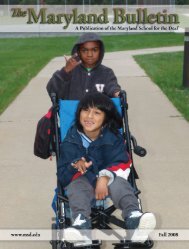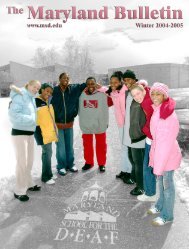Frederick Campus - Maryland School for the Deaf
Frederick Campus - Maryland School for the Deaf
Frederick Campus - Maryland School for the Deaf
Create successful ePaper yourself
Turn your PDF publications into a flip-book with our unique Google optimized e-Paper software.
ASL <strong>for</strong> Students<br />
American Sign Language (ASL) is acknowledged as <strong>the</strong> natural language of <strong>the</strong> <strong>Deaf</strong> community. ASL is<br />
offered on both an instructional level <strong>for</strong> those students desiring an academic study of <strong>the</strong> language and also at<br />
an intervention level <strong>for</strong> students who have not attained a sufficient functional command of <strong>the</strong> language.<br />
ASL <strong>for</strong> Families<br />
MSD provides American Sign Language (ASL) instruction to families and caretakers. These classes are<br />
available to all family members and caretakers of students enrolled at MSD. ASL classes may be offered every<br />
fall and spring semester in <strong>the</strong> evenings. There may be a nominal fee <strong>for</strong> class materials.<br />
From pre-school on, each student receives services to help <strong>the</strong>m become effective communicators. Services<br />
provided individually and in small group settings are…<br />
Audiology<br />
� Comprehensive Diagnostic assessments: As required by IDEA 2004 or more frequent as<br />
requested by parents. These assessments include measurement of auditory status, audiograms<br />
<strong>for</strong> admissions/transfer/exit, and to report and communicate findings with all IEP team members.<br />
� Hearing Aid and Cochlear Implant Services: Recommend, program, fit/adjust, troubleshoot,<br />
secure repairs, verify per<strong>for</strong>mance, facilitate communication between MSD and outside Hearing &<br />
Speech services. Cochlear implant programming services, which include adjustments,<br />
troubleshooting, repair follow-up, verification of per<strong>for</strong>mance and facilitation of communication<br />
between <strong>the</strong> student's implant hospital center and family. Programming services are not offered<br />
during <strong>the</strong> 1st year post implantation.<br />
� Home visit: Family education and support as well as private pre-school in-service workshops <strong>for</strong><br />
children receiving support from our Family Education Program.<br />
� Assistive Technology: Recommend, monitor, adjust and secure repairs <strong>for</strong> classroom listening<br />
enhancement systems and assist families in evaluating and selecting additional assistive<br />
technology <strong>for</strong> personal purchase.<br />
� In-service Training: To MSD staff and community members regarding audiology, hearing aids,<br />
cochlear implants and assistive technology.<br />
Communication Services<br />
Spoken Language sessions are available <strong>for</strong> enrolled students, as specified in <strong>the</strong> Individualized Education<br />
Plan (IEP). A Speech-Language Pathologist, Audiologist and/or <strong>Deaf</strong> Educator assesses students<br />
communication skills. This in<strong>for</strong>mation assists <strong>the</strong> team in developing a communication plan to enhance <strong>the</strong>ir<br />
student’s receptive and expressive English language skills. Direct <strong>the</strong>rapy is provided in small groups or during<br />
one-on-one sessions, ei<strong>the</strong>r on a pullout basis and/or an inclusion setting, based on <strong>the</strong> individual needs of<br />
each student. All MSD staff are licensed and/or certified in <strong>the</strong>ir area of specialty.<br />
These sessions can include, but are not limited to <strong>the</strong> following:<br />
� Auditory Training—detection, discrimination, identification, and comprehension<br />
� Articulation/Pronunciation Training<br />
� Phonological Awareness<br />
� Speechreading Skill Training, including oral/motor skills<br />
� Pragmatic Language Training (e.g. establishing eye contact, turn taking, maintaining a topic of<br />
conversation)<br />
� Communication Strategies to prevent or repair communication breakdowns<br />
� Augmentative Communication Training<br />
� Language Expansion—both receptive/expressive language building<br />
� Fostering a link between spoken English and literacy<br />
Parent and Student Handbook, 2012-2013 <strong>Frederick</strong> 54






